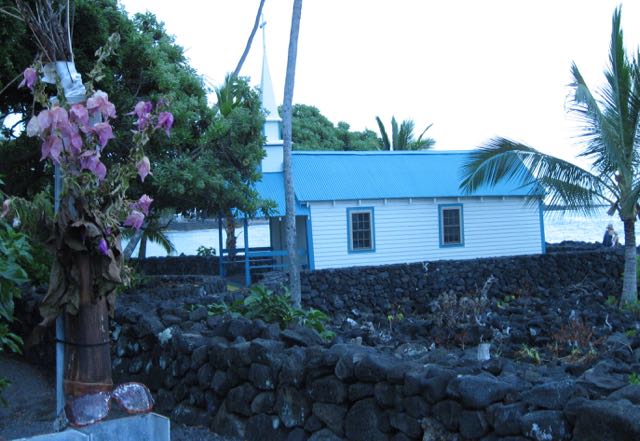The Hawaii Ironman run starts at the pier, @ mile 0 of Ali’i Drive, just past the corner with Palani. Since the finish comes down Ali’i to same spot, the run rises up Palani one block, turning right onto Kuikini which parallels Ali’i. This particular section, about a half mile long, includes both the first mile and the last mile of the race, so if you time things right, you can be starting out your run at the same time your favorite pro might be finishing. Those going about 12-12:30 for the day have this opportunity for reflected fame, as the photo motos following the leaders catch a fleeting image of the slower mortals. The route continues down Hualalai back towards the ocean and Ali’i. There, finishers turn right, those just starting out turn left. The next 9 miles follows the sea-hugging Ali’i, which offers at least the possibility of shade, as the afternoon sun gets filtered by trees and condos lining the Drive. A rolling route, small ups and downs the whole way, despite the level sea just meters away.
The Little Blue Church heralds the turn around back into town. St. Peter’s Church, part of the St. Michael Parish, was built in 1882, just a mile north of its present location. A hundred years ago, it was moved, stick by stick, to a level foundation of lava rocks at one of the gnarliest surfing spots along the Kona coast. That foundation once held the Ku’emanu Heiau, the only known Hawaiian shrine devoted exclusively to surfing. While the grass shack no longer exists (the Little Blue Church is there now), people still treat the remaining altar as sacred, a spot for offerings to the surfing gods. A microcosm of the melange which is modern Hawaii, new cultural artifacts and traditions existing with some harmony and a bit of dissonance side-by-side with the old.
The church does not play a part in any Ironman legends, coming as it does so early in the run. But many a bike leader has struggled along here while a more patient, sleeker runner passes for the lead. For the rest of us, it serves as the marker that the first, and easiest, segment of the run is over. The return trip takes us to the other side of Ali’i, away from the shade, and just that much farther from the occasional respite of ocean breezes squeezing through the cracks between dwellings.
Today, I ran most of that route, up and back, turning around just past the church. It was a typically oppressive day, and I was smothered by moisture and soul-sapping heat. The best way through that soup, for me, is to run within myself. Not only going slow enough to drink and eat, but also to keep my gaze inward, not focus on the external at all. This almost bit me last year. A lady who regularly swims with my wife and I at the Y on Sundays, annually goes to Kona for a week, along with her husband, who stays a month or more, around the time of the Ironman. Last year, she told us she would be at the aid station just before that church. It’s kind of a funny one, near the turn around, giving us a chance for fluids twice in a half mile. I skipped the outbound aid, and almost forgot to fuel up when I came back around. Just as I remembered I needed to get some water, I looked up, saw a cup in my face, and there was Debbie, silent but with a smile on her face, holding one out for me.
It’s on the Ali’i out and back that I begin wrapping my head around the pace I need to go to stay in the game. Often, it’s 20-25% slower than usual. Meaning, if I’m doing an *easy* marathon, I’m running at about 8:30-40 minutes per mile. Today, I averaged 9:37. And on race day, if I go 10:30 miles, I will count it a success. It’s really hard to go that slow, for that long, in those conditions. But it’s the only way to the finish. The Little Blue Church, with seating for twelve inside, is used mostly for weddings. As I pass, I should think about getting married to that pace, and draw strength from the twin altars, to the Catholic Jesus and the surfing royals.
**********
Correction: yesterday, I reported on a man who had chained himself to the Ironman sign at the pier. I stated he was protesting the purchase of WTC by Wang Jianlin’s one of the richest men in China. I misstated his reason. While he points out the large sums of money accruing to many involved in the sale, he is upset not with the sale itself, nor its association with a foreign buyer, but with the request by the new owners that the fee paid by WTC for use of the pier race week be dropped from $60,000 to $30,000. Today, the chains, locks and posters detailing the protester’s concerns were still there; he was not.

